Top Gear comes to China with a touch of manicured glamour
- Published
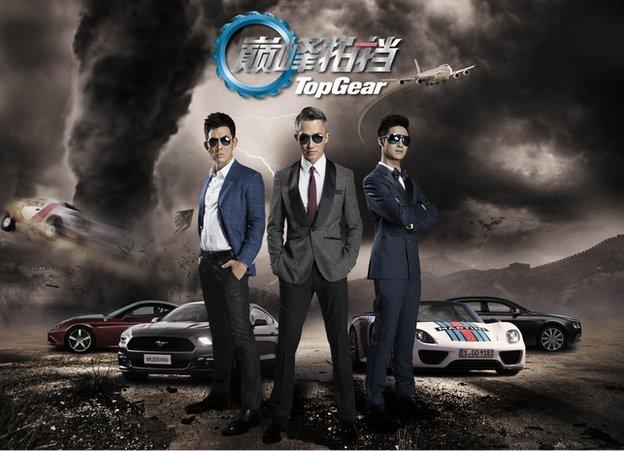
Top Gear's Chinese version has a more glamorous look than the British version
Forget the Queen, The Beatles or James Bond - in many parts of the world today the face of Britain is a TV series about cars.
Last year, Top Gear, the BBC car-review show that's been running since 1977 became the most watched factual television programme on the planet.
Each episode is now broadcast in more than 200 nations and territories and seen by 350 million people.
There is though one notable exception.
The world's most populous country has managed to hold out against Messrs Clarkson, Hammond and May's quest for complete global domination and remained a Top-Gear-free-zone.
Until now.
But when the first episode finally made it onto Chinese screens last week, via the state-run Dragon TV network, there was something missing.
China has gone for a presenter line-up with - how shall we put this - a little less mileage on the clock.
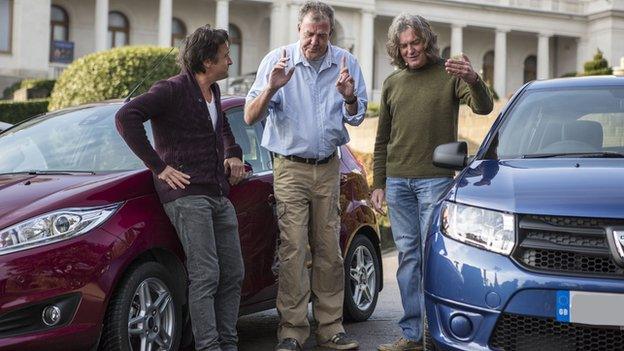
British presenters Richard Hammond, Jeremy Clarkson and James May will not be on the Chinese version
The Top Gear Three, described as many things over the years but never "youthful", have been replaced with a far more polished trio.
Cheng Lei, the new Clarkson, is a well-manicured Dragon TV host, all suits and sharp waistcoats.
As for his two sidekicks, Ren Xianqi is an actor, singer and racing driver and Tian Liang is an Olympic diving gold medallist.
There is not an un-tucked shirt or an un-kempt hair-do in sight.
The Chinese version of Top Gear made it on to screens last week
But what about the content itself and the some of those key qualities - the irreverence and occasional ability to offend - for which the UK version is so loved and sometimes loathed?
Will they too be polished away?
Fans of the show will be relieved to know that the same grungy studio is still there, as is the laddish banter and the sense of pure, petrol fuelled fun.
There's a Chinese Stig - the mystery, white-helmeted test-track driver - and the Star-in-a-Reasonably-Priced-Car feature remains, allowing the Chinese version, if the first episode is anything to go by, to lean even more heavily on celebrity guests.
The point of making local-versions of TV shows is that it allows audiences to connect with them more intimately, without the need for subtitles or voice-overs, and it allows the programme makers to better tailor the content, the style and the humour for local tastes.
There is already a Korean Top Gear and a US Top Gear - again, similar style, different presenters - and a French Top Gear is in the making.
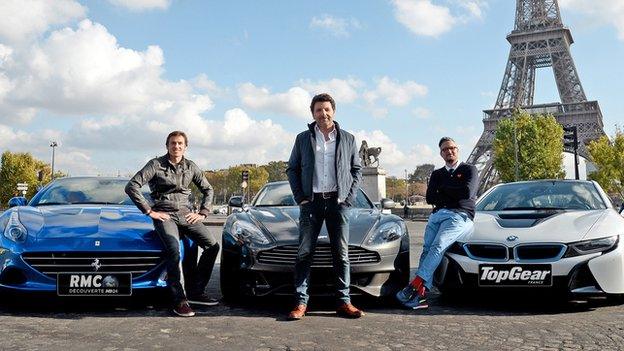
Top Gear's French version with Yann Larret, Philippe Lellouche and Bruce Jouanny, launched in May 2014
But if the Top Gear team can crack it, then China is undoubtedly the big prize; a chance for the BBC to connect one of its most valuable brands with the new car-crazy consumers in what is now the biggest car market in the world.
This is a country that is currently putting 1.5 million new cars onto its roads every month. That's right, every month.
That all adds up to a very large potential audience and some very large potential advertising and merchandising revenue for BBC Worldwide, the corporation's commercial arm.
We were all set for our interview with Cheng Lei.
The plans were in place and we were asked to send a broad outline of the kind of questions we wanted to ask, and we were happy to oblige.
We were keen to know what made him tick, what sort of style he would try bring to the programme and whether he really was going to be the Chinese version of Jeremy Clarkson.
'Communist tendencies'
But we also included on our list a question about some of the downsides of China's booming car market in terms of the chronic pollution it is contributing to and the country's grim road safety record.
Would the programme, we wondered, be tackling those issues?
And then we hit a bump.
That last question, we were told, was 'inappropriate' and, shortly afterwards, our interview was cancelled and despite numerous attempts, never reinstated.
Jeremy Clarkson once railed against what he called the BBC's "communist tendencies" after a presenter suggested to an interviewee that the Ferrari she chose to drive was not a particularly practical choice of car.
We don't know whether he would consider my question about China's smoggy skies as part of the same hand-wringing, anti-car nonsense.
But the Chinese programme makers disliked it for a very different reason of course and the Chinese Jeremy Clarkson, as it happens, really does work for a Communist Party controlled broadcaster.
He may well, for all we know, be a card-carrying member of the Party.
And that raises some interesting issues.
Interviews can, admittedly, be cancelled for all sorts of reasons and the sensitivity about one of our questions could simply be down to an overzealous press officer.
Mr Cheng might indeed simply have been too busy.
But it could also be a sign that the host of Chinese Top Gear is going to be a little more timid than his outspoken, polemical British counterpart.
.jpg)
Top Gear China's presenters from left to right, Richie Jen, Cheng Lei and Tian Liang
That's a point I put to Pierre Cheung, BBC Worldwide's Vice President and General Manager in China.
"We send executive producers from the UK to work with the China team to help them and train them to keep the essence of the brand," he tells me.
"There are all sorts of guidelines that we place upon the China team to make this a global brand, rather than just a show for China."
And yet, I suggest, Mr Cheng unlike Mr Clarkson is unlikely to find it easy to criticise Chinese government transport policy for example or to suggest that he would like to find the civil servant responsible for speed cameras and "stick some cocktail sticks into his eyes."
"It will be for them to judge," he replies. "I wouldn't say on behalf of the host whether he should or should not say anything."
The BBC is at pains to point out that the three Chinese presenters are not meant to be carbon copies of anyone and none of them have been specifically assigned to play the part of Mr Clarkson.
Detractors of the UK show may say that's a very good thing given his ability to upset people - like the populations of whole countries.
Well perhaps, but China's suppression of free speech does not make the country's television artistically or morally better, only politically safer.
During our filming behind the scenes, while still pushing in vain for our interview, we heard this following exchange in front of the cameras.
Cheng Lei: "If you see a car being driven badly you know it's bound to be a woman driver behind the wheel."
Ren Xianqi: "That's not exactly true - not all men are good drivers."
Cheng Lei: "Well, if a man doesn't know how to drive then he's a sissy."
Whether that little exchange makes it to air or not it shows one thing for certain.
In its Chinese form the programme has not lost the ability to offend.
Put it this way; if the programme is a Ferrari then its garish green paintwork has been retained.
What is less clear is whether under the bonnet, all that it good about this global phenomenon - the integrity, the independence and the irreverence - will be stripped away by the mechanics of China's media.
- Published31 October 2014
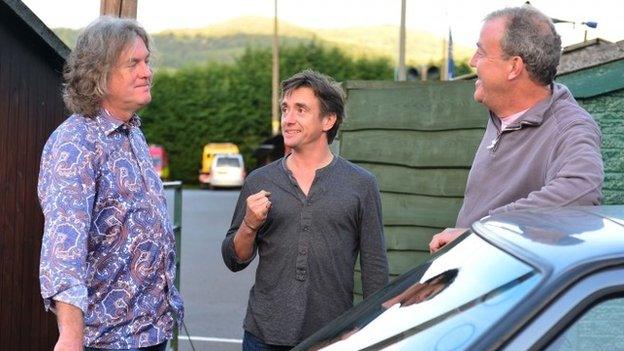
- Published4 October 2014
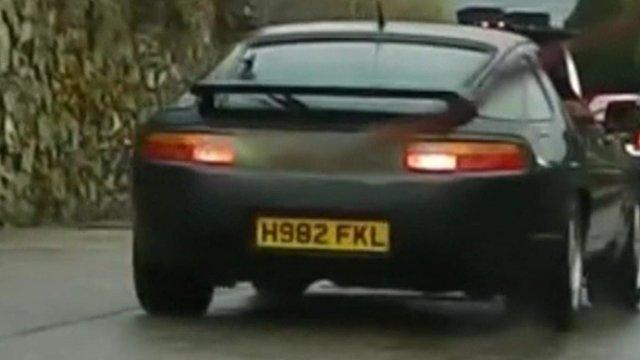
- Published23 April 2014
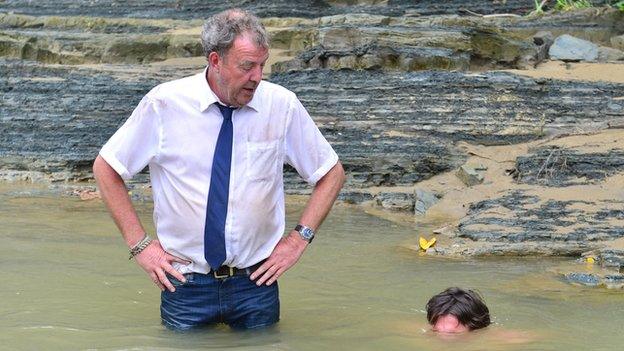
- Published2 May 2014
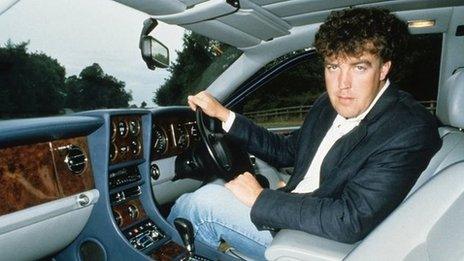
- Published28 December 2010